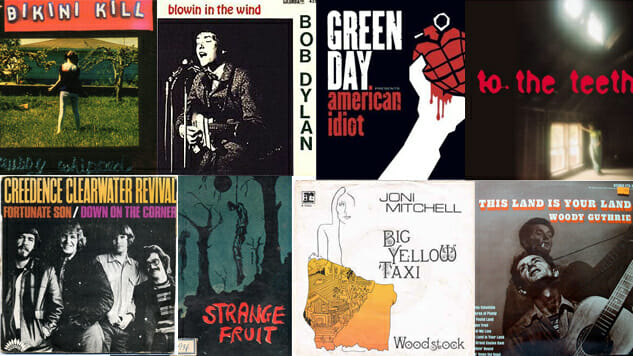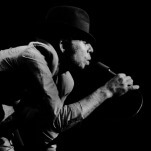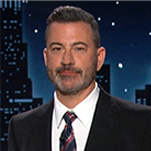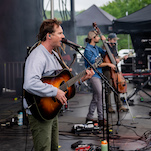The 50 Best Protest Songs of All Time

It’s been said that music can change the world. Some might denounce that as exaggeration, but at minimum, music does have the power to stir emotions and bring attention to worthy causes. Over the decades, protest songs have led the way, offering a powerful and passionate testimony to those suffering, while urging listeners to lend support and solidarity in response.
There is no shortage of great protest songs—in fact, we’ve covered Canada-specific protest songs from their last tumultuous election, contemporary protest songs by people of color, protest songs that are anti-fascist and more. In these trying times, we’ve attempted to distill some of these best protest songs of all time, so here are 50 that have impacted our collective consciousness.
50. Green Day, “American Idiot”
The title track of their 2004 album “American Idiot” ushered Green Day into the 21st century with the pop punk snark of their youth with the anger of the Bush era. The album opens, “Don’t wanna be an American idiot / Don’t want a nation under the new media / And can you hear the sound of hysteria? / The subliminal mind-fuck America.” A direct response to the nation’s deteriorating international perception and its internal hysteria in response to 9/11, “American Idiot” looked inward and outward simultaneously and cemented Green Day’s legacy in the history of punk. —Hilary Saunders
49. Bright Eyes, “When the President Talks to God”
Originally released as a digital download in 2005 and later released as the B-side to the “First Day of My Life” 7”, this Bright Eyes song encapsulated the anti-Bush sentiment. When the Commander in Chief was invading countries that didn’t have anything to do with the attacks on September 11 and allowing domestic issues like poor education funding and drug addiction to run rampant, Conor Oberst imagined a conversation between the drawling Texan and the Holy Father above. Although Oberst performs the song solo acoustic, his rage, and those of America’s, is palpable. —Hilary Saunders
48. USA for Africa, “We Are the World”
Written by Michael Jackson and recorded by a veritable supergroup of popular performers—Bob Dylan, Stevie Wonder, Paul Simon, Billy Joel, Bruce Springsteen, Dionne Warwick, Lionel Richie, Harry Belafonte and Cyndi Lauper to name but a few—the record was intended as way to draw attention to the dire famine epidemic that was sweeping the African continent. It quickly hit No. 1 and served its purpose, conveying a meaningful message that relief was needed to avoid further catastrophe. —Lee Zimmerman
47. The Byrds, “Draft Morning”
Striped down to a trio following the firing of outspoken singer/guitarist David Crosby and the on-again, off-again departure of singer Gene Clarke, the reconstituted Byrds regrouped as a trio consisting of Roger McGuinn, Chris Hillman and Michael Clarke as they cut the remarkably diverse The Notorious Byrd Brothers. This song, culled from that set, was originally written by Crosby and usurped by McGuinn and Hillman over Crosby’s objections. Nevertheless, it details the horrors faced by a young draftee as he comes to grip with the visceral images of combat and calamity. —Lee Zimmerman
46. Richard Fariña, “Birmingham Sunday”
Written in response to the bombing of a Birmingham church in 1963 that killed four young girls who were inside at the time, the song assured Fariña’s ascent in early ‘60s protest circles, a trajectory that found him rivaling Dylan in terms of his folk following. Tragically, Fariña was killed in a motorcycle accident in Carmel California in 1966, but his songs continue to resonate in today’s singer/songwriter circles. Plainsong’s recent tribute, Reinventing Richard, is merely the latest example. —Lee Zimmerman
45. Helen Reddy, “I Am Woman”
Don’t let Australian-American Helen Reddy’s sweet voice wavering over an audibly-‘70s acoustic guitar strum fool you: “I Am Woman” is a fighting song. Written during and for the women’s liberation movement of the 1970s, the song has endured from its release through Hillary Clinton’s presidential run. And in the wake of the Women’s March on Washington (and all of its international subsidiaries), the opening line “I am woman, hear me roar / in numbers too big to ignore” illustrates just how far we’ve come in terms of gender equality, yet how much further we need to go. —Hilary Saunders
44. U2, “Sunday Bloody Sunday”
U2’s immortal anthem quickly became one of the most popular songs, as Bono and the band took their protest up several notches in response to tragic events of Ireland’s Bloody Sunday massacre. Its relentless wail and refrain leaves a lingering impression. —Lee Zimmerman
43. Donovan, “Universal Soldier”
Written by Buffy Sainte-Marie but brought to prominence by Donovan during his early folkie phase, no single song better detailed the plight of the conscripted soldier or career mercenary than this mid ‘60s lament about the perils of war and the devastating effects it leaves in its wake. The song makes the point that borders are meaningless when it comes to those in the front lines, and that all those who fight their nation’s battles remain mere pawns in a futile struggle. —Lee Zimmerman
42. Against Me!, “Transgender Dysphoria Blues”
The title track of Against Me!’s Transgender Dysphoria Blues cuts right to the chase after Laura Jane Grace’s highly publicized tale of coming out as transgendered in 2012. Here, the songwriter gives every bit of grit she’s been known for with heartbreaking line after line: “You want them to notice/ The ragged ends of your summer dress/ You want them to see you like they see any other girl/ They just see a faggot/ They hold their breath not to catch the sick.” With an inbox stacked with albums retelling tales of lost love, sometimes recorded in cabins; or musings on the human condition; or on weirder days, food, Grace’s gutting honesty on this not-so-universal experience is the realest thing I’ve heard in…I really couldn’t tell you how long . —Tyler Kane
41. The Youngbloods, “Get Together”
The song, meant as a salve during one of the most divisive times in American history (present day circumstance notwithstanding), was a populist take on a folk song written by Dino Valenti, later of Quicksilver Messenger Service. An appeal for unity in a polarized world, it offers the option of choosing love over hate, brotherhood rather than animosity, the impassioned refrain resonates even today. —Lee Zimmerman
40. The Impressions, “People Get Ready”
Penned by Curtis Mayfield and recorded by the band he belonged to at the time, “People Get Ready” foretold a turn in the tide as far as the battle for equality and recognition were concerned. Sung like the revered gospel song it is, it uses the popular imagery of a train to describe an evolution in attitude and action leading to greater glories for those who have been oppressed and pushed aside. A true standard in every sense, it hit the top of the charts on its original release, and has been covered by scores of artists since, with Bob Dylan, Bruce Springsteen and Rod Stewart among the many. —Lee Zimmerman
39. Jefferson Airplane, “Volunteers”
By 1967, Jefferson Airplane had shifted its flight path dramatically, moving away from the folk sounds that inspired them early on into the realms of psychedelia and the bold embrace of the Summer of Love. By 1969, with the release of the Volunteers album, they were firmly caught up in the political discord that wracked the world, and America in particular. This song sets the pace with a furious marching rhythm and a clarion call for the disenfranchised to rally for rebellion. The final clarion cry, “Up against the wall, motherfuckers,” made it clear there was no other choice. —Lee Zimmerman
38. Dead Kennedys, “Nazi Punks Fuck Off”
After the release of their debut album Fresh Fruit for Rotting Vegetables in 1980, Dead Kennedys frontman Jello Biafra noticed that much of his lyrical satire was being taken literally as an influx of neo-Nazis started infiltrating their shows. Incredibly incensed by this unanticipated and unwelcome turn of events, his direct response was to write the song “Nazi Punks Fuck Off,” release it as the lead single for their follow-up album In God We Trust, Inc., and include a free armband in the 7” single that featured a crossed-out swastika (a symbol which was also used on the vinyl’s label sticker). While many of the verse’s lyrics are specific to the anti-Nazi movement within the early punk subculture, the song’s simple chorus (“Nazi punks, Nazi punks, Nazi punks, FUCK OFF!”) is a cathartic refrain whose evergreen employment never falls out of use. —Will Hodge
37. Barry McGuire, “Eve of Destruction”
This Dylan-esque P.F. Sloan cover warned of the world’s demise back in 1965. McGuire name-drops everything from “Red China” to “Selma, Alabama” and calls out, “senators [who] don’t pass legislation / And marches alone can’t bring integration” and still managed to became a No. 1 hit. —Hilary Saunders
36. Sly & The Family Stone, “Everyday People”
Years before Sly Stone’s drug addiction and enigmatic persona fully materialized, he was changing the way people viewed soul and pop music from a musical, cultural and racial standpoint. On Stand!, Sly & the Family Stone achieved a near-perfect balance, especially with songs like “Everyday People” that represented a movement toward racial equality. —Max Blau
35. Loretta Lynn, “The Pill”
Initially banned from numerous radio stations, the ode to birth control broke down major barriers for women—enabling them to stand up for their reproductive rights in ways never before imagined. The first oral contraception had been formerly introduced in 1960, and it assisted heartily in the women’s rights movement. Lynn hints at her own personal life in the song, and she has had enough of getting pregnant every year. From her 1975 album Back to the Country, she’s now ready and able to make “up for all those years.” It’s quirky, clever and uplifting, as she marvels in her newfound sense of freedom. “Mini-skirts. Hot pants. And a few little fancy frills,” she lists off, antsy for all the trendy fashions she’ll now be able to wear. Later, she smirks, “And you can’t afford to turn it down ‘cause you know I’ve got the pill.” —Jason Scott
34. Kendrick Lamar, “Alright”
One of the hit singles off of Lamar’s 2015 masterpiece, To Pimp A Butterfly, “Alright” has become an anthem to the Black Lives Matter movement. It is often chanted as BLM protests to capture pride in the face of incredible, unrelenting adversity. The song itself narrates the experience of a black American male—much like Lamar—on the streets of Compton, where he grew up. This song, as well as the rest of TPAB is rife with references of gangs, prison, institutional racism and unwarranted police violence. “Alright” also finds ways to pull out silver linings and prime diverse communities to fight. As Lamar sings on “Alright”, “When you know, we been hurt, been down before, nigga/ When our pride was low, lookin’ at the world like, ‘Where do we go, nigga?’/And we hate po-po, wanna kill us dead in the street for sure, nigga / I’m at the preacher’s door / My knees gettin’ weak and my gun might blow, but we gon’ be alright.” —Alexa Peters
33. Bruce Springsteen & The E Street Band, “Born in the U.S.A.”
I once had an in-class debate with the program director of my graduate school course about whether or not “Born in the U.S.A.” is a protest song. This was in England, so maybe they didn’t get it, but Bruce Springsteen’s 1984 Grammy award-winning hit is undoubtedly a protest song. Although musically rousing thanks to that sweet keyboard synth, the subversive lyrics actually tell a story about the Vietnam conflict and its lasting personal, political and industrial ramifications at home and in that “foreign land.” —Hilary Saunders
32. Peter, Paul and Mary, “If I Had A Hammer”
One of the leading groups of the early ‘60s, Peter, Paul and Mary took inspiration from old-timey folk groups and reinvigorated it with pop harmonies fitting for the day. This cover of an old Pete Seeger tune was one of the many hits off the trio’s self-titled 1962 debut album. —Hilary Saunders
31. James Brown, “Say It Loud (I’m Black and I’m Proud)”
It doesn’t matter what color your skin is; we can all appreciate the sentiments of James Brown’s classic civil rights anthem. He howls, “Some people say we’ve got a lot of malice / Some say it’s a lot of nerve / But I say we won’t quit moving until we get what we deserve.” It’s a sentiment still resonant today. —Bonnie Stiernberg
30. Little Steven & Artists Against Apartheid, “Sun City”
Siding themselves with an imprisoned Nelson Mandela, Steve Van Zandt and an ad hoc group of players dubbed the Artists Against Apartheid took a firm stance against a racist regime in South Africa. It’s an anthem that railed against those who would play at the country’s major entertainment complex, dubbed Sun City. Scores of big name artists took part in the recording, including Bruce Springsteen, Ringo Starr, Bob Dylan, Lou Reed, U2, Keith Richards, Jackson Browne, Bonnie Raitt, Pete Townshend and Joey Ramone, just to name a few. Although the song only climbed to the middle reaches of the pop charts, it did manage to raise more than a million dollars for the cause. —Lee Zimmerman
29. Country Joe and the Fish, “I Feel Like I’m Fixin’ To Die Rag (The Fish Cheer)”
One of the highlights of Country Joe’s memorable appearance at Woodstock, the profanity laced “Fish Cheer” represented a generation’s disdain and frustration with the politicos who sent America’s sons to fight futile wars without regard for the loss of life. It’s one, two, three, four, what are we fighting for? I don’t give a damn, next stop is Vietnam.” The band’s dark humor notwithstanding, it foretold the the doom and despair many a young conscripted soldier felt when their draft board summoned them for military service. —Lee Zimmerman
28. M.I.A., “Paper Planes”
M.I.A. has stated that the gunshot and cash register sound effects on this Kala track are supposed to be a statement about how immigrants are perceived by mainstream society. We’ll admit to doing the little gun motion while jogging down empty streets, though. —Bonnie Stiernberg
27. Ani DiFranco, “To The Teeth”
Ani DiFranco, a regular and beloved visitor to the Paste Studio in NYC, has never been one to shy away from politics over the course of her 20 studio albums (and counting). One of the most outspoken activists and feminists in the musical community (her own independent record label is called Righteous Babe, after all), DiFranco bears all in this ballad response to the massacre at Columbine High School. —Hilary Saunders
26. Sleater-Kinney, “Entertain”
Despite punk’s general embrace of social progressiveness, there aren’t nearly as many women in the genre’s upper echelons as there are men. However, the ones that are there definitely make sure that their voices are heard, especially the women of Sleater-Kinney. Though the band had been putting out amazing albums like Dig Me Out and One Beat before 2005, that year saw the release of their then-final record The Woods, their most sprawling and ambitious effort, yet. “Entertain,” the first single from the album tackles feminism and media control, as well as a reference to 1984. —Adam Nizam
25. Bikini Kill, “Rebel Girl”
Bikini Kill was of the most important feminist punk band of the riot grrrl movement. This song in particular, likely the band’s most recognized song, refutes heteronormative ideas and celebrates female solidarity. Radical for the 1990s, the two-and-a-half-minute song still remains an anthem during these times of reassessing the notion of gender on a spectrum rather than a binary. —Hilary Saunders
24. Joni Mitchell, “Big Yellow Taxi”
One of the most important environmental protest songs, Joni Mitchell released this song in 1970 in response to her first trip to Hawaii. With the chorus of “They paved paradise and put of a parking lot,” the song quickly and bluntly criticizes the way humans disrespect and destroy nature. Unfortunately, when the Counting Crows and Vanessa Carlton covered the song in 2002, it still sounded fresh. And in a time when climate change deniers still hold office, “Big Yellow Taxi” is more important that ever.” —Hilary Saunders
23. Grandmaster Flash And The Furious Five, “The Message”
Released in 1982, “The Message” was one of the most important songs to elevate hip-hop to the platform of social commentary. The Bronx-based group rapped verses about urban poor and inner city violence, culminating in the refrain, “It’s like a jungle sometimes / It makes me wonder how I keep from going under.” A standout track in its own right, “The Message” ultimately paved the way for future political raps from N.W.A. and Public Enemy. —Hilary Saunders
22. Elvis Costello & The Attractions, “What’s Funny About Peace, Love and Understanding”
Written by Nick Lowe and originally recorded for his seminal band Brinsley Schwarz, the song received its greatest attention when Elvis Costello chose to record it as a B-side and subsequently added it as an afterthought to his album Armed Forces. A propulsive rocker, it’s uncertain whether Lowe or Costello intended it as a song of protest, but its opening lines—“As I walk through this wicked world / Searching for light in the darkness of insanity / I ask myself if all hope is lost / Is there only pain and hatred and misery?”—make it a poignant plea regardless. Indeed, that same question could be asked today. —Lee Zimmerman
21. Joan Baez, “Joe Hill”
Made famous by Baez’s solitary performance at Woodstock, “Joe Hill” is a requiem for a union boss who died at the hands of the mining bosses while leading a resistance to unfair labor practices. Gone, but not forgotten, the issues he advanced and the causes that he fought for still resonate long after his passing. —Lee Zimmerman
20. Rage Against the Machine, “Testify”
Rage Against The Machine brought revolution to the forefront of commercial rock in a time when politics had taken a backseat on the charts. RATM, much like Orwell’s protagonist Winston Smith, were disillusioned with systemic flexes of absolute power. Their 1999 record The Battle of Los Angeles coincided with many politically tense events—Bill Clinton’s deregulation of Wall Street, the continued Zapatista rebellion in Chiapas and the WTO riots (or “The Battle In Seattle”) that sought to tear down corporate hegemony. Los Angeles itself was still healing from the Rodney King Riots in 1992, which makes frontman Zack de la Rocha’s references to 1984 all the more poignant. At the end of the song, de la Rocha gravely intones the (paraphrased) slogan of the novel’s Party: “Who Controls the Past Now, Controls the Future, Who controls the Present Now, Controls the Past.” —Madison Bloom
19. Gil Scott-Heron, “The Revolution Will Not Be Televised”
Before the official advent of hip-hop, politically charged poet Gil Scott-Heron delivered spoken word proto-rap over an instrumental fusion of jazz, blues, soul and more. Scott-Heron released over a dozen albums of unconventionally smooth streetwise social critique throughout the 1970s and into the early 1980s, but his most well-known composition, “The Revolution Will Not Be Televised,” was the first track on his first album, 1970’s Small Talk at 125th and Lenox. Using an onslaught of pop cultural references and slogans to make an ironic commentary on the romanticized concept of revolution, Scott-Heron strives to individualize and localize the catalysts to true change, closing with the sobering reminder “The revolution will be live.” —Will Hodge
18. N.W.A., “Fuck Tha Police”
This 1988 track remains controversial, and while we definitely don’t advocate violence against the police—or anyone, for that matter—we do think the Straight Outta Compton song is worth a listen if only to get a sense of the racial tensions that plagued L.A. in the late ‘80s and early ‘90s. —Bonnie Stiernberg
17. Aretha Franklin, “Respect”
Nearly 50 years after its release, “Respect” is still ubiquitous. This classic Otis Redding cover is not only one of the best Aretha tracks, but also one of the best songs of all time. From that very first “WHAT you want…” it’s clear this is an anthem, one that timed out perfectly with the civil rights era and the feminist movement, but it can be applied to pretty much anyone who’s looking for a little R-E-S-P-E-C-T. Aretha demanded her propers, and nearly half a century later, she still reigns as the Queen of Soul, thanks in no small part to this undeniable track. —Bonnie Stiernberg
16. Buffalo Springfield, “For What It’s Worth”
Written in response to the riots that pitted police against teenagers on L.A.’s Sunset Strip in November 1966 after authorities imposed a curfew on L.A.‘s club-going contingent, this song was, and remains, a primary anthem of resistance that in many ways set the standard for the modern protest era. Ironically, it was originally left off the first pressings of Buffalo Springfield’s eponymous debut, only to be reinstated later on once it became the band’s signature song. Although the dominant lyric — added to the official title — is “Stop, Hey, What’s That Sound,” the more popular title “For What It’s Worth” came about when its writer, Stephen Stills, allegedly told label head Ahmet Ertegun, “I have this song here, for what it’s worth, if you want it.” Nevertheless, it’s that singular sound that reverberates today. —Lee Zimmerman
15. Phil Ochs, “I Ain’t Marching Anymore”
As the American public and mass media learned in the ‘60s, one of the best ways to protest unsavory governmental decisions was through song. Phil Ochs, the Texan-born singer, self-described social democrat, and revolutionary, epitomized this. “I Ain’t Marching Anymore” criticizes America’s futile Vietnam invasion with zing and zest over quick acoustic strumming in the tradition of folk heroes like Pete Seeger and Woody Guthie. —Hilary Saunders
14. The Staple Singers, “Long Walk to D.C.”
So many of The Staple Singers’ songs could be included in this list. Led by patriarch Pops Staples, the family group sang everything from gospel classics to soulful originals. “Long Walk to D.C.,” originally written by Homer Banks and Marvell Thomas and released by The Staple Singers in 1968, became one of the group’s most beloved. Following the racial inequality protest marches from Selma to Montgomery in 1965, “Long Walk to D.C.” continues that momentum all the way to the capital. In fact, it became one of the most iconic songs associated with the Civil Rights Act of 1968. —Hilary Saunders
13. Creedence Clearwater Revival, “Fortunate Son”
John Fogerty’s furious rocker, released at the height of the Vietnam War when thousands of boys at the bottom of the economic strata were being drafted and sent overseas to fight, while the sons of the very rich were shielded with exemptions, dramatically emphasized the disparity between rich and poor. “It ain’t me,” Fogerty insists, adding his voice to the disenfranchised. —Lee Zimmerman
12. Edwin Starr, “War”
Edwin Starr asks the most pertinent question of all. “War, huh, yeah…What is it good for?” The answer is obvious. “Absolutely Nothing!” Say it again indeed. —Lee Zimmerman
11. Nina Simone, “To Be Young, Gifted, and Black”
Although the album version of this significant song appeared on Nina Simone’s 1970 album Black Gold, the single was actually released in 1969, thus making it eligible for this list. Written in honor of Simone’s friend Lorraine Hansberry, author of the play A Raisin in the Sun (which, consequently, takes its name from Langston Hughes’ poem “Harlem”), the song became an anthem of the Civil Rights Movement. The song is vocally percussive, yet smooth and swaying; its bold lyrics are both timely for the era, yet utterly timeless in an age where Black Lives Matter. —Hilary Saunders
10. Bob Marley and the Wailers, “Get Up, Stand Up”
Bob Marley was a populist hero if ever there was one, and this song, with its simple, unaffected refrain, spoke in generalities about the need to assert oneself in the face of tyranny and oppression. Credit Marley and company with getting the message over without the heavy handedness that often plagues many protest songs of this type. —Lee Zimmerman
9. Public Enemy, “Fight The Power”
Fans of Spike Lee’s Do The Right Thing will remember how this blazing-hot track set the tone for the entire film. Chuck D raps lyrics like, “You gotta go for what you know / Make everybody see, in order to fight the powers that be / Lemme hear you say fight the power.” The anti-racism song, which calls out government entities that perpetuate the system, later appeared on Public Enemy’s 1990 studio album Fear of a Black Planet. —Bonnie Stiernberg
8. Crosby, Stills, Nash & Young, “Ohio”
As Neil Young’s reaction to the killings of four students at Kent State University during a showdown with the Ohio State National Guard on May 4, 1970, the song resonates as a visceral reminder of the perils of protest, especially when facing an unflinching enemy. Rush released within a few weeks of its recording, the lyrics—“Tin soldiers and Nixon coming”—still send shivers up and down the spine nearly 50 years later. Crosby’s wails of “How many more?” convey the shock and horror in a palatable way. —Lee Zimmerman
7. John Lennon, “Imagine”
Widely recognized as the greatest song of Lennon’s solo career, “Imagine” remains a singular plea for peace and understanding. In fact, “Imagine” is often considered one of the best songs of all time. —Lee Zimmerman
6. Marvin Gaye, “What’s Going On”
The late Marvin Gaye made a seismic shift in musical direction with his 1971 masterpiece What’s Going On, an album which found tha dinger addressing a wide range of social ills and troubling trends in humanity. The title song, sung from the point of view of a Vietnam veteran who returns home to see his country torn asunder, encapsulates the fear, uncertainty and discord that enveloped the nation — and indeed the world — as the ‘60s gave way to the ‘70s and more and more young men faced the possibility of being sent to die on foreign soil. A brilliant, emotional plea for sanity, it remains the absolute highlight of Gaye’s fabled career. —Lee Zimmerman
5. Sam Cooke, “A Change Is Gonna Come”
Inspired by an incident in which Cooke and his band were turned away from a white-only motel in Louisiana, Cooke wrote this song to bring attention to the struggles plaguing America in the sixties. “It’s been a long time coming, but I know a change is gonna come,” Cooke promises, suggesting there’s light at the end of long tunnel. Never a major hit as far as the charts were concerned, the song nevertheless remains one of Cooke’s most memorable compositions and one which continues to serve his legacy well. —Lee Zimmerman
4. Bob Dylan, “Blowin’ in the Wind”
The tune that endeared Dylan to legions of card-carrying folkies, “Blowin’ in the Wind” remains the standard template for every protest song that’s come along ever since. It defined its writer and singer as a champion of blue-collar resistance and put him on the front lines during those epic civil rights struggles of the ‘60s. Recorded countless times by others—Peter, Paul & Mary, for whom it was a hit, and his paramour Joan Baez in particular, it remains a battle cry in the struggle for change and enduring defiance. —Lee Zimmerman
3. Pete Seeger, “We Shall Overcome”
Written as a gospel hymn by a Methodist minister in 1900 and originally adapted during a tobacco workers strike in 1945, “We Shall Overcome” came to represent defiance, endurance, tenacity and sheer determination. In short, this anthem of the Civil Rights movement sums up the courage and conviction that underscored African Americans’ demand for equal rights and opportunities. Adapted by a flock of folk singers over the years, Pete Seeger and Joan Baez in particular, it subsequently became the theme for many a protest rally and effort towards peaceful resistance. Likewise, it’s as meaningful in today’s troubled times as it was more than a half a century ago. —Lee Zimmerman
2. Woody Guthrie, “This Land Is Your Land”
One of the most iconic songs in American lore, “This Land Is Your Land” is actually such an important protest song for the verses that aren’t typically sung. Although ostensibly innocuous with its three chords and easy rhymes, roamin’, ramblin’ troubadour Woody Guthrie originally wrote two more verses to this ode to America’s natural beauty and idealistic values. Those lost verses criticize wealth inequality and extremist capitalism. In fact, by 2002, the song was added to the National Recording Registry by the Library of Congress. —Hilary Saunders
1. Billie Holiday, “Strange Fruit”
This track has to be at the top of the list; it’s that influential. One of the first racism protest songs to be recorded in popular music, 1939’s “Strange Fruit” is based off a poem written by Abel Meeropol. Holiday sang the song for the first time at Café Society in Greenwich Village, which was the first integrated nightclub in New York City. With the song’s blatant indictment of racism in the American South, it’s said that Holiday was afraid of retaliation every time she sang the song. Not to mention, no record label would touch it. Eventually, Milt Gabler put the track out on Commodore records after Holiday’s a cappella performance of it brought him to tears. Despite being aware of the danger of singing a song like this as black woman, Holiday sings “Strange Fruit” with unwavering bravery and intention, her emotive voice bolstering its timeless meaning. —Alexa Peters







































